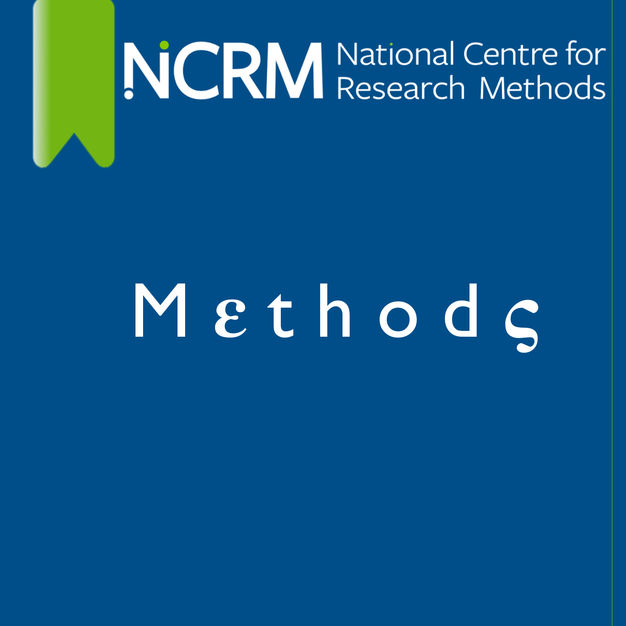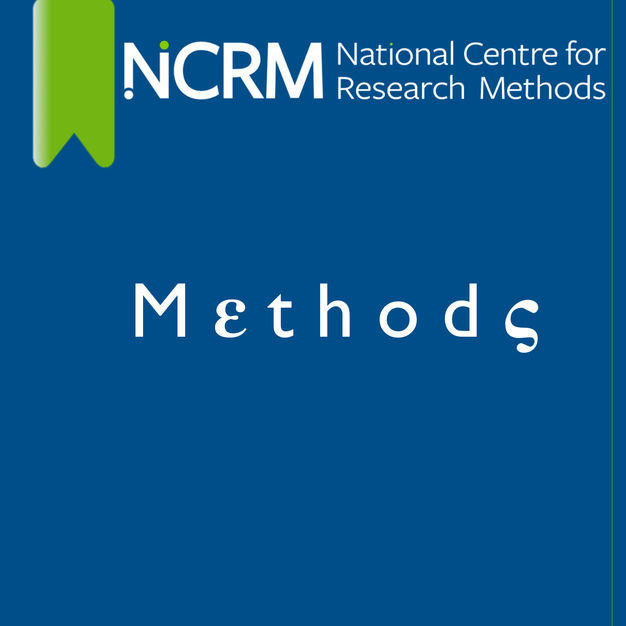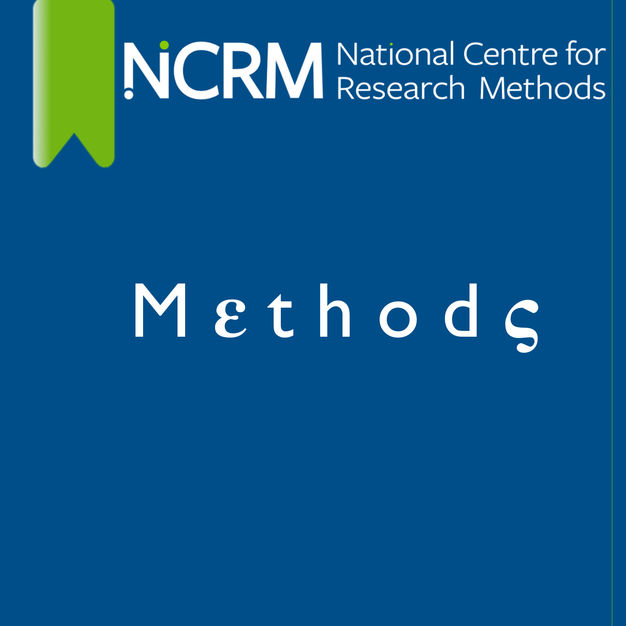
Methods
National Centre for Research Methods
The National Centre for Research Methods (NCRM) conducts research and training in social science research methods, aiming to advance methodological understanding and practice across the UK social science research community. This podcast series highlights developments in methodological research in social sciences. NCRM coordinating Hub is based at the University of Southampton.
- 21 minutes 24 secondsLaura Bernardi on mixed methods and research questions (NCRM) - Catherine McDonald, Laura Bernardi
In this episode of the Methods podcast, host Catherine McDonald talks to Laura Bernardi, Professor of Demography and Sociology of the Life Course within the LIVES Centre at the University of Lausanne. Laura is also the former Deputy Director of the Swiss National Centre of Competence in Research (LIVES), which studied the effects of the post-industrial economy and society on the development of vulnerability – using a longitudinal and comparative approach.
Laura discusses just how mixed mixed-methods can be, how most research questions relating to change and development over time lend themselves well to longitudinal and mixed methods research, and the importance of establishing and retaining professional parameters with study participants.
This series of the Methods podcast is produced by the National Centre for Research Methods as part of the EU Horizon2020 funded YouthLife project, and is looking at how researchers can do better longitudinal research on youth transitions.
For further information on the YouthLife project, visit www.EUqualimix.ncrm.ac.uk
27 April 2023, 12:00 am - 29 minutes 8 secondsJD Carpentieri on qualitative research and theory (NCRM) - Catherine McDonald, JD Carpentieri
In this episode of the Methods podcast, host Catherine McDonald talks to JD Carpentieri, Associate Professor of Social Science and Policy in the Department of Education, Practice and Society at University College London, and an Honorary Research Associate at the Centre for Longitudinal Studies.
JD talks about how qualitative research can add nuance to theory, which questions he feels are best suited to mixed methods longitudinal research and he shares his top tip on keeping participants on board. He also explains how he likes to try different analytic techniques for different studies.
This series of the Methods podcast is produced by the National Centre for Research Methods as part of the EU Horizon2020 funded YouthLife project, and is looking at how researchers can do better longitudinal research on youth transitions.
For further information on the YouthLife project, visit www.EUqualimix.ncrm.ac.uk
29 March 2023, 12:00 am - 26 minutesLaura Camfield on undertaking cross-national mixed methods research (NCRM) - Catherine McDonald, Laura Camfield
In this episode of the Methods podcast, host Catherine McDonald talks to Laura Camfield, Professor of Development Research and Evaluation in the School of International Development at the University of East Anglia.
Laura discusses cross-country comparisons, the importance of theory in relation to mixed methods work and gives her advice around what can and can’t be compared. She also talks about the ethical challenges around presenting project work in regard to recognising younger researchers and other members of the team.
The series of the Methods podcast is produced by the National Centre for Research Methods as part of the EU Horizon2020 funded YouthLife project, and is looking at how researchers can do better longitudinal research on youth transitions.
For further information on the YouthLife project, visit www.EUqualimix.ncrm.ac.uk
22 February 2023, 12:00 am - 25 minutes 22 secondsDan Woodman on mixed and qualitative longitudinal approaches (NCRM) - Catherine McDonald, Dan Woodman
In this episode of the Methods podcast, host Catherine McDonald talks to Dan Woodman, Associate Professor of Sociology at the School of Social and Political Sciences at the University of Melbourne. Dan is an internationally recognised authority on conceptualising generational change and the social conditions impacting our young adults.
Dan discusses explains what drew him to his area of study, why iterative models are so important in longitudinal research and how reciprocity can help reduce attrition. He also talks about his approach to writing and being wary of allowing the data to simply say what you want it to say.
This series of the Methods podcast is produced by the National Centre for Research Methods as part of the EU Horizon2020 funded YouthLife project, and is looking at how researchers can do better longitudinal research on youth transitions.
For further information on the YouthLife project, visit www.EUqualimix.ncrm.ac.uk.
25 January 2023, 12:00 am - 20 minutes 19 secondsJane Gray on researching social change over time (NCRM) - Catherine McDonald, Jane Gray
In this episode of the Methods podcast, host Catherine McDonald talk to Jane Gray, Professor of Sociology at the Social Sciences Institute at Maynooth University in Ireland. Jane is the programme leader for the Irish Qualitative Data Archive and played a key role in the development of the Digital Repository of Ireland and her research looks at families, households and social change.
Jane discusses her passion for looking at how individual lives intersect with macro social change and what patterns can be found within that, the range of different approaches she adopts when it comes to analysis and the importance of knowing your audience when it comes to the writing up of your research.
The Methods podcast is produced by the National Centre for Research Methods as part of the EU Horizon2020 funded YouthLife project, and is looking at how researchers can do better longitudinal research on youth transitions.
For further information on the YouthLife project, visit www.EUqualimix.ncrm.ac.uk
29 November 2022, 12:00 am - 33 minutes 21 secondsJohnny Saldaña on qualitative longitudinal research (NCRM) - Catherine McDonald, Johnny Saldaña
In this episode of the Methods podcast, host Catherine McDonald talks to Johnny Saldaña, Professor Emeritus at Arizona State University’s School of Film, Dance and Theatre, and a leading authority on qualitative and qualitative longitudinal methods.
Johnny discusses his research methodology model and shares advice his advice on research questions, analytical approaches and writing. He also shares his experience of an ethical dilemma he faced and tells us what his key bit of advice would be to his younger self.This series of the Methods podcast is produced by the National Centre for Research Methods as part of the EU Horizon2020 funded YouthLife project, and is looking at how researchers can do better longitudinal research on youth transitions.
Content warning: This episode includes a reference to suicide.
If you have been affected by any of the issues raised in this episode, you can call Samaritans for free on 116 123, email them at [email protected], or visit www.samaritans.org to find your nearest branch.
For further information on the YouthLife project, visit www.EUqualimix.ncrm.ac.uk
26 October 2022, 12:00 am - 16 minutes 9 secondsMaking space for Big Qual: new ideas in research methods and teaching (NCRM) - Lynn Jamieson and Sarah LewthwaiteIn a special mini-series of our podcast, we discuss the secondary analysis of large-scale qualitative data as a new research method. Here Lynn Jamieson from the University of Edinburgh and Sarah Lewthwaite from the University of Southampton reflect on the method’s development and potential use in the teaching of research methods.20 December 2018, 12:00 am
- 14 minutes 15 secondsTeaching Big Qual: benefits and challenges for students and teachers (NCRM) - Ros Edwards and Sarah LewthwaiteIn a special mini-series of our podcast, we discuss the secondary analysis of large-scale qualitative data as a new research method. Here Ros Edwards and Sarah Lewthwaite from the University of Southampton talk about how the method might benefit and challenge teachers and students of research methods.20 December 2018, 12:00 am
- 13 minutes 50 secondsRemember your body: a somatics toolkit for ethnographers (NCRM) - Eline KieftA researcher’s physical sensations are widely understood to contribute to their insights into people and culture. Yet there are no adequate courses that teach students how to use their body as a research instrument. It’s a gap that a group of NCRM funded researchers are trying to plug with the development of a somatics toolkit, as Eline Kieft from the University of Coventry explains in this episode of the Methods Podcast.11 October 2018, 12:00 am
- 5 minutes 57 secondsA short introduction to the Timescapes Archive (NCRM) - Kahryn HughesWe introduce the TimeScapes Archive, an archive designed to enable the sharing and re-use of datasets that have been generated using qualitative longitudinal research methods. Our guest is Kahryn Hughes. Kahryn is the Director of the TimeScapes Archive and co-director of the Centre for Research on Families, Lifecourse and Generations at the University of Leeds.26 September 2018, 12:00 am
- 11 minutes 36 secondsFood for thought: using fitness bracelet technology to tackle poor nutrition in low-income countries (NCRM) - Giacomo ZanelloMany of us use fitness watches to get fitter, but could the technology behind these devices help the millions of people across the world who don’t have enough food to eat? In this episode of the Methods Podcast, Dr Giacomo Zanello from the University of Reading discusses research presented at the ESRC Research Methods Festival, looking at how the technology is being used to tackle poor nutrition among farmers and their families in low-income countries.6 August 2018, 12:00 am
- More Episodes? Get the App
Your feedback is valuable to us. Should you encounter any bugs, glitches, lack of functionality or other problems, please email us on [email protected] or join Moon.FM Telegram Group where you can talk directly to the dev team who are happy to answer any queries.
 Research in Action | A podcast for faculty & higher education professionals on research design, methods, productivity & more
Research in Action | A podcast for faculty & higher education professionals on research design, methods, productivity & more
 Qualitative Conversations
Qualitative Conversations
 NCRM Research Methods Festival 2012 filmed sessions
NCRM Research Methods Festival 2012 filmed sessions
 NCRM What is? series
NCRM What is? series
 Understanding Society Podcast Series
Understanding Society Podcast Series
 Give Methods A Chance
Give Methods A Chance